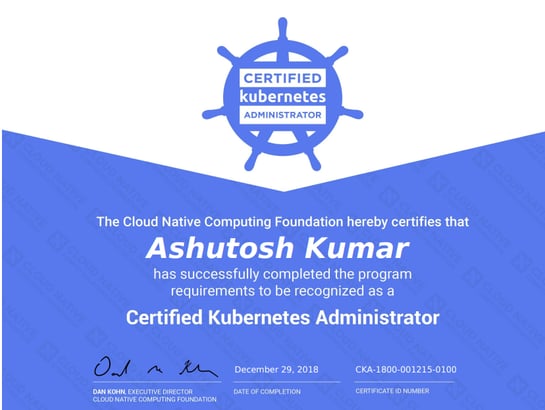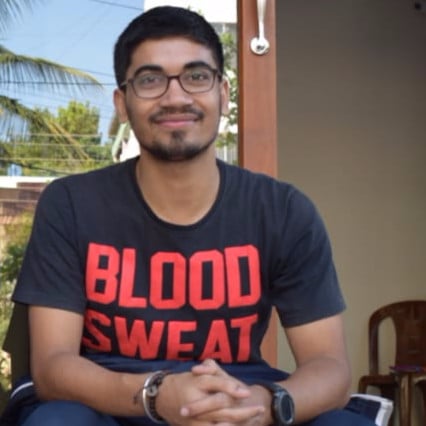Hello my fellow Kubernetes Developers,
I would like to tell you about my experience with the Certified Kubernetes Administrator (CKA) exam.

I was first exposed to Kubernetes when I started to work on OpenEBS, a Container Attached Storage solution.
After working on the project for a period of time, I thought about taking the CKA certification exam. I took approximately one and a half months to practice and get my hands dirty. I completed the exam on the 28th of December 2018, and was excitedly able to pass the exam.

CKA is about making friends!

I started to explore Kubernetes Docs which, in my opinion, is the greatest source for learning Kubernetes. I applied my newfound knowledge to the project. My in-house team members my company MayaData, namely Karthik, Amit, Vishnu, and Kiran just to name a few, groomed me and provided me with the right knowledge. From there, I started to develop more interest towards the subject.
In mid-November 2018, I started to do an exhaustive walkthrough of Kubernetes docs and practiced it.
Obviously, there were a few things that did not make sense to me as Kubernetes covers a vast domain, e.g. Network, Linux, etc.
Throughout my experience, I would frequent the Kubernetes Slack channel and ask questions. I also began to attend local meetups. From there, my journey in making friends and a Kubernetes Mastermind began. I met Suraj Narwade on one of the meetups, where he shared his experience on how he learned Kubernetes.
I came to know about the Kubernaut Slack channel, a space where you can join and ask about Kubernetes-related information, such as setting up CNI, performing workload operations, etc.
This journey was very exciting, and it became a journey to make new friends and, of course, this led to becoming a CKA.
About the Exam

- The duration of the exam is 3 hours.
- There will be 6 Kubernetes clusters on which the questions are based.
- There are 24 total questions.
- You are allowed to open only Kubernetes Docs in the exam.
- Go through the Kubernetes docs exhaustively, especially the concepts and task sections, so that when you see a question you can easily open the relevant topic in docs quickly.
- Practice with Kubectl, e.g. create a deployment, service etc. without writing YAMLs.
https://kubernetes.io/docs/reference/kubectl/conventions/ - Avoid writing YAMLs as much as possible in the exam.
- Don’t just read the docs, but put them into practice.
- Know about systemctl commands.
- Set up your own cluster from scratch using Kubernetes Hard Way. I applied a little trick here; first I became familiar with basic Kubernetes constructs, played with workloads(e.g. Deployment, daemon set etc), services etc. on an already configured Kubernetes cluster. Then I did it the hard way.
- Some folks also advise studying books and other learning materials, but I personally did not follow any books.
Visit the following link to learn more about exam
https://www.cncf.io/certification/cka/
Read the candidate handbook and exam tips pdf carefully. These can be found at the website link given above.
To learn more about the exam syllabus, visit the following link:
https://github.com/cncf/curriculum

- Go through the Kubernetes docs exhaustively, especially the concepts and task sections, so that when you see a question you can easily open the relevant topic in docs quickly.
- Practice with Kubectl, e.g. create a deployment, service etc., without writing YAML.
https://kubernetes.io/docs/reference/kubectl/conventions/ - Avoid writing YAMLs as much as possible in the exam.
- Don’t just read the docs, but put them into practice.
- Know about systemctl commands.
- Set up your own cluster from scratch using Kubernetes Hard Way. I applied a little trick here; first I became familiar with basic Kubernetes constructs, played with workloads(e.g. Deployment, daemon set, etc), services etc., on an already configured Kubernetes cluster. Then I did it the hard way.
- Some folks also advise studying books and other learning materials, but I personally did not follow any books.
I will paste some useful resource links that might be helpful in addition to the Kubernetes docs.
- https://suraj.pro/post/journey-to-cka/
- https://github.com/walidshaari/Kubernetes-Certified-Administrator
- https://medium.com/@sonasingh46/static-pod-in-kubernetes-e3854507655f
- https://medium.com/@sonasingh46/story-of-pod-manifest-to-running-8e4b38f074ec
Definitely join the Google Kubernaut Slack channel.
Channel id: https://kubernauts-slack-join.herokuapp.com/
All the best for your journey in making new friends and cracking the Certified Kubernetes Administrator (CKA) exam!
This article was first published on Mar 5, 2019 on OpenEBS's Medium Account






Game changer in Container and Storage Paradigm- MayaData gets acquired by DataCore Software
Don Williams
Don Williams
Managing Ephemeral Storage on Kubernetes with OpenEBS
Kiran Mova
Kiran Mova
Understanding Persistent Volumes and PVCs in Kubernetes & OpenEBS
Murat Karslioglu
Murat Karslioglu